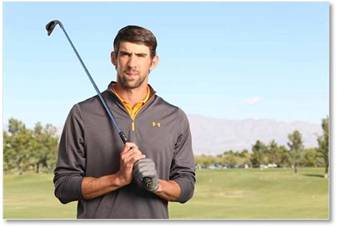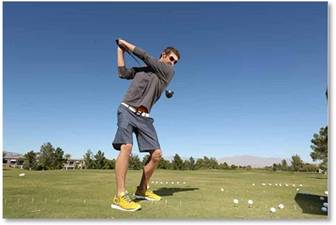If you are going to talk to an Olympian and have nothing to ask, you might as well embarrass yourself in front of the greatest one alive. Yes, yours truly recently had a chance to catch up with Olympic great Michael Phelps and his golfing coach Hank Haney – he only helped a little known golfer named Tiger Woods. Not content to just relax and enjoy a well-earned break from swimming, Phelps has decided that what he really wants to do with his life is fix his Golf Game.
The Haney Project will follow Phelps over the course of eight, 60-minute episodes to see if he can outperform his predecessors from previous seasons, which have included Charles Barkley, Ray Romano, Rush Limbaugh and Adam Levine. David Feherty, one of television’s most irrepressible personalities who returns for a third season of his self-titled interview series, Feherty joined the call.
What is the one thing that you hope that Hank can help you with, and secondly, as a world?class athlete, is it at times a bit humbling and a bit frustrating not being able to master another sport?
MICHAEL PHELPS: I don’t think there’s just one thing that I’m going to learn in the sport. I think there’s too much for me to learn in the sport. For an example, I just recently partnered with PING and I was down sort of trying to find the right shaft for me.
I was literally like they were twisting each shaft in and out of every club and we were trying to figure out what the best one was for me and my speed and my swing, and I learned that there’s like 50 or 60 different shafts that they can put on a club.
So I’m learning something different every day about the sport, and you know, it’s a tough sport, and like I said, it’s a very challenging sport. And this is the most humbling sport. I’m used to being able to pick up something and just ?? I don’t want to say it coming naturally but it comes a lot easier than what golf has come thus far.
I think that’s part of the challenge why I’m so excited to do it, because I don’t like to fail in anything that I do, and it will be a struggle to be able to reach the point that I wanted to reach, but it’s something that I want bad enough, and I think if you want something bad enough, there’s nothing standing in your way of getting it.
Why golf? How difficult was it?
MICHAEL PHELPS: It was something I was interested in for a long time. Obviously watching people like Tiger and Phil and now watching some of the younger guys come up in the sport, it’s just interesting to me to see so many different styles and see so many incredible things that these guys are doing all over the world on different courses.
In other sports, I could pick up a basketball and shoot a basketball. I could pick up a lacrosse stick and be fine. I can play baseball. I can play soccer. Like I feel like I can participate in a lot of other sports but I think in the sport of golf, there are so many different levels.
I have friends who play as a scratch golfer, and for me it would be exciting to be able to get down to where I could compete with them. So it’s a challenge for me, and it’s something that, like I said, keeps me ?? sure, it’s not like I can go out and play a perfect round and hit all good shots, but that’s what really keeps me coming back to try to reach that point.
I’m sure it’s very challenging and who knows if it’s possible to hit every perfect shot in a round. But it’s obviously something that I am learning and hopefully I can go out and enjoy the game even more than I already have.
From an athletic and training point of view, how different is it from swimming?
MICHAEL PHELPS: Probably not too much different. You know, if you want to be the best golfer in the world, you probably have to putt in just as much time as I put in the sport of swimming. There have been many times on the show where we have hit 500 to 1,000 golf balls, just being on the range.
You know, it’s a work out in itself, because for me I’m trying to make sure my grip stays on; to make sure my takeaway is the same; make sure I’m not coming too steep down on the ball; make sure I’m getting full rotation. You know, there are so many little things that I have to work on and have to constantly think of what I am hitting a shot or when I am swinging a club so that I can I guess take away spraying the ball or putting it out?of?bounds or just trying to keep it in play.
There are a lot of things that are constantly going on in my head, and obviously repetition is the highest form of learning, so the more I can do that, the better off I’ll be.
What do you think of the controversy with this weekend’s round of golf with the President and Tiger? (The President played around of Golf and everyone seems to be turning it into a big issue)
HANK HANEY: I guess I didn’t see the controversy. Sounds like they enjoyed their round of golf and I’m sure it was fun for both of them. Other than that, I really don’t have a comment.
On the issue of pressure, I know it’s a different kind of pressure, but Michael, did you feel pressure to perform and to get something out of doing these shows and make Hank look good and to make yourself look good? Is there a pressure involved in this process for you?
MICHAEL PHELPS: I mean, I don’t want to answer this question for Hank, but I think that when we both have passions and we both have a goal. We want to do everything that we can to accomplish that goal.
Hank knows what I want to accomplish and I told him that, and he’s going to do everything he can to get me there, and one day, I’m sure it will happen. But I think in a sport like this, in any sport, it really depends on how much time I’m willing to putt into practicing to be able to get to that point. I put a lot of pressure on myself. I don’t like to fail. I don’t like to fall short of a goal.
So I mean, I think that’s just where the pressure comes from on my standpoint, and I’ll say that being able to play in the Waste Management and also playing in The Ryder Cup Pro?Am, I felt pressure there because I’ve never played golf in front of thousands of people. I guess that was an interesting and new experience.
Hank, this is your fourth installment in the series of dealing with various players, the celebrities; do you feel pressure? You obviously want to be able to show progress during the show that someone is improving. Just talk a little bit about that aspect.
HANK HANEY: Yeah, this is our fifth year. You know, as a coach, you always feel that. I feel that with every student that I’ve ever taught. But I don’t think anyone will ever judge any harder than I would judge myself.
So I realize that you’ve got to try to achieve the best that you can possibly do, but then there are limitations, and golf is a hard game, and it takes a lot of practice and it takes time. And when you’re inhibited, if you will, by doing a series of shows, the time frame is pretty short, and you have to be realistic.
But the great thing that I’ve been doing this year, Michael really gets that. He understands. He gets that small steps, baby steps; he says it all the time, and that’s the attitude that you have to have.
I’m always one that just if we are in the right direction; if we are on the right road and we are on the right path and going in the right direction, it’s never been something to worry me about when am I going to get there or how long is it going to take. As long as you’re making progress, you’ll get there, as long as you just keep working at it, and that’s the way that I judge it.
But obviously you like to look good and have your student hit good shots. Nobody enjoys their students’ good shots more than I do and nobody agonizes over the bad shots like I do, either, but I’m sure every coach feels the same way.
MICHAEL PHELPS: I may have some times where I’m pretty upset after a bad shot, so we could have a little bit of argument there (laughing).
There are more great golfers the size of Tom Watson and Luke Donald than maybe compared to Michael; is size an issue, being that tall?
HANK HANEY: Yeah, the size is an asset and it’s also detriment, too, because the taller you are, the longer your arms are, and the more speed you’re going to have and the more power you have. But also, that brings you wildness.
When you look at the game today, there’s so many players with big arcs that are playing; Bubba Watson who Michael played with at the Waste Management Pro?Am, he’s got a huge arc and he’s tall and he hits it forever. Phil Mickelson is not a short guy and he has a big, big swing and big arc, and obviously Ernie Els is big.
So you’re seeing more of it. That’s why they all say, the player that is bigger and taller has a lot of potential, but what that usually means is he also has a hard time finding his ball. The player that’s short, he can always find his ball, but he’s never somebody they look at and say, wow, you’ve got a lot of potential.
So it’s fun as a coach to work with somebody that has power and that has potential to achieve, really, anything that he wants to achieve. It’s just a question of time and how much work they put into it.

